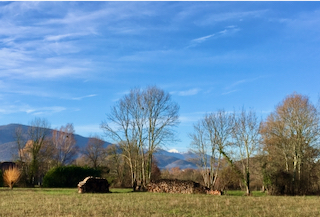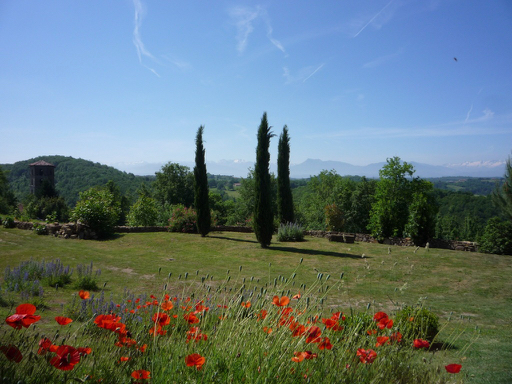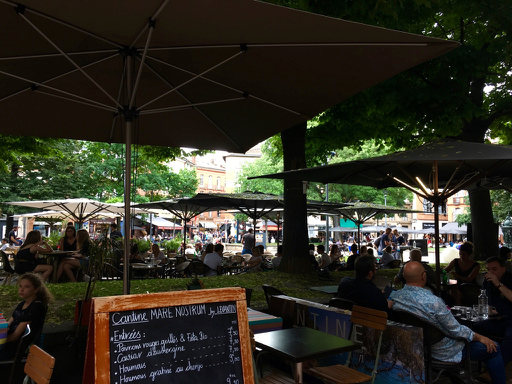View from the Foothills of France Some personal views on living, working,
bringing up family and making the dream happen in the most beautiful region of France. View from the Foothills of France also includes some personal and professional thoughts and tips on finding and buying the perfect property in the Ariège and Haute Garonne regions.
|
By nadia, on 11th December 2019 
I have been asked a lot recently whether Brexit will change the tax situation of foreigners buying property in France. Tax laws are, however, regulated by independent laws and treaties negotiated between individual countries rather than the EU. This includes the double taxation treaty which was put in place between France and the UK in 2009 to prevent people paying tax twice on the same income.
Most of the regulation around tax is based on legal residency but it is important to note that there is a difference between legal residence and tax residence. It is easy to end up being a tax resident in two countries which is when it becomes important to check that a double taxation treaty exists between your home country and France to ensure that you are not taxed for the same income in two countries.
The distinction between legal residency (the legal right to reside in France) and residency for tax purposes (which determines whether you are taxed on your worldwide income and gains in France or just that arising in France) is, however, not always straightforward.
The most often quoted rule as to whether you are tax resident in France is that you spend more than 183 days in the country (in the calendar year). If so, then you are considered to be resident for tax purposes and will be taxed in France on your worldwide income. Whereas if you spend fewer than 183 days in France, you might be considered as a legal resident but not tax resident and hence you would pay tax only on income generated in France.
However, it can be more complicated than this because, under French rules, there are other criteria that can mean you will be deemed resident in France for tax purposes. So it is perfectly possible that, even if you spend fewer than 183 days in the country, you are still considered a tax resident and will be required to pay tax in France while also being liable to pay tax in your home country (hence the tax treaties to ensure you pay some in each rather than pay double). The main criteria for determining tax residence are:
- If your main residence is in France (in other words where you base yourself, where your spouse/close family lives; your foyer)
- If your principle activity is in France (even if you work for a foreign company this still applies if you do your work regularly from France)
- France is where you have your most valuable assets
If it is decided that you are tax resident in France, you are liable to pay French tax on your worldwide income, gains and wealth. However, the UK/France double tax treaty provides that generally if you are classified as resident in France but work in the UK then you pay UK tax on this income and this is not taxed directly in France. This does, however, need to be declared on your French tax form and added to any other income to determine your overall tax rate. You then receive a credit equal to the French tax and social charges that would have been due meaning you do not pay tax in France on your UK income although it does increase the rate of tax you pay on your other taxable income.
It is worth remembering that, although France is generally considered to be a high-tax country, in fact, if you have children or a large family, it can be beneficial to pay tax in France because French income tax is calculated based on the household income, not on individual income so the tax is based on the number of individuals in the household.
The French tax year is the same as the calendar year and the tax return is called a déclaration de revenus. It can be filled in online and the deadline for submission is May. As in the UK, you may also be liable for capital gains tax on gains made from the disposal or sale of assets. If you do become tax resident in France, it might also pay to review your savings and investment structures because often what is tax efficient in the UK is usually not in France.
Tax residency and tax liability are extremely complicated and your situation is unlikely to be the same as your neighbour’s. In addition, please note that I am not a financial expert and the regulations change regularly so this is just a rough guide and I would always recommend taking financial advice as part of your planning when looking to buy property in France. I can point you in the direction of experts in all fields and can advise and help with your property search so please get in touch: nadia@foothillsoffrance.com.
Like this:Like Loading...
By nadia, on 6th November 2019 
I have posted this before but it bears repeating, even for me who sees hundreds of houses a year. All of us set out to find our dream house when we start our property search in France; the perfect French home, ‘the one’. The problem is that the perfect house doesn’t really exist except in our heads; every house has its compromises. So what should you compromise on and what should you absolutely not?
1. The view. This is my number one client search request; nearly everyone wants a view whether it is of rolling hills, beautiful gardens, bucolic fields of flowers, a pretty market square or snow-capped mountains. And this is something that a house either has or not (unless it’s possible to cut down some trees to reveal a hither-unseen view). This is, therefore, one area where I suggest you should not compromise if it is important to you.
2. Walking distance to a café or boulangerie. Another favourite on the list of ‘must-haves’ but more difficult to find than you would probably imagine. I will find it if I can but it might involve many more compromises on other factors on your wish-list.
3. A large garden/lots of land. This is a common criterion for British buyers (less so for Australians, South Africans and Americans who perhaps are more realistic about the work involved!) I understand the attraction of this and, if it is a permanent home, go for it. If it is a holiday home and everything else about the house ticks your boxes but the garden is smaller than you would have ideally liked, it is worth compromising.
4. A swimming pool. Again, often top of the ‘wish-list’ but keep in mind that it is better to buy a house that fulfils most of your search brief but doesn’t have a pool than to buy a house with a pool that is not quite the right house. You can always put in a swimming pool but you cannot easily change the fundamentals of the house.
5. A large kitchen/dining room/open plan living space. This is an ever more popular request thanks to the way we live nowadays. However, most clients are looking for a traditional, old French house and these were not designed to be open plan. Smaller, individual rooms and often a very small galley kitchen are the norm. I would, however, tell a client not dismiss a house because it does not tick this box – usually you can open up rooms or take down walls to create exactly the space that suits you.
6. No renovation work. Horror stories abound about the trials and tribulations of undertaking a renovation in France but often this is thanks to the power of television; plenty of people renovate very happily and successfully in France. It is not a cheap process but, if you go into it with your eyes open, it is one of the best ways of creating your dream home so don’t rule out this option if the location, position, style, setting, size and price of the house are all right.
7. Easy access and within an hour of a major airport. This is another condition that starts at the top of the ‘wish-list’ but often gets dropped in favour of other ‘must haves’. I would, however, suggest that this is one area in which you should not compromise if you are going to be commuting or travelling regularly to your home in France – an hour to an hour and a half is do-able but anything more becomes a serious effort and you cannot change this longer term.
I could go on but, in summary, when deciding where and how to compromise to achieve your ‘perfect house’: If something can be changed such as décor, room layouts, finishes, heating or electric systems, then it is worth compromising. If it is an element which absolutely cannot be changed such as the view, the location, the proximity to services or accessibility, think long and hard about your priorities before compromising. You can’t pick up your perfect house and move it somewhere else but you can find the perfect location and gradually change a ‘compromise’ house into your perfect dream house.
Like this:Like Loading...
By nadia, on 1st October 2019 
Toulouse was recently voted one of the best places to live and work in France. It has both lifestyle appeal and a wide variety of industry and employment opportunities as well as excellent transport links to the rest of the world. Add to that the great southern climate, the gentle pace of life, museums and galleries, history and stunning architecture, easy access to the mountains and the coast and a plethora of great bars and restaurants and it is not difficult to see why it attracts around 10,000 new residents per year just in the city alone with many more in the surrounding region.
In addition, unlike other major cities in France, property and cost of living are still reasonable in this region and the quality of life here always tops the league tables. Toulouse is France’s fourth largest city with everything that such a metropole has to offer but it also has the feel of a friendly southern town with a great diversity of cultures and nationalities and a very cosmopolitan air.
Toulouse is also a thriving city for students; it has a world-renowned university and is ranked as the second best place in France to be a student (after Grenoble). The city’s 100,000 students enjoy some of the best employment opportunities in France and first-class local initiatives.
Toulouse has seen France’s biggest economic growth in recent years and also boasts France’s biggest population growth over the past 20 years, the majority from other areas of the country, attracted by the job opportunities, climate and lifestyle. There is plenty on the doorstep to fill the weekends from the cultural events within the city, its numerous green spaces and the popular bike hire scheme with plenty of cycle routes within and around the city. There is also the Garonne river that snakes right through the middle of the city, perfect for a stroll or a picnic on the banks and, further afield, the Canal du Midi, the Atlantic and the Mediterranean coasts and the Pyrenees; a world-class destination for hiking and skiing. Spain is also within easy reach.
Toulouse is the perfect city to have on the doorstep, great for day trips, culture, fantastic restaurants, entertainment and employment as well as an international transport hub to the rest of the world.
If you are interested in discovering more or would like help with your property search, please get in touch: nadia@foothillsoffrance.com
Like this:Like Loading...
By nadia, on 31st July 2019  One of the many lovely squares in Toulouse France is consistently ranked as one of the most popular countries in the world for students looking to study abroad and not just in Paris; numerous French cities are home to globally ranked universities, offering foreign students a high-class university experience and an excellent quality of student life.
France has a reputation for being a global leader in academia and is already the world’s top non-English speaking student destination. The French government offers scholarships to attract international students and, like most countries (apart from perhaps the UK right now), France realizes the many benefits of attracting students from abroad. Hence, Macron has made it one of his aims to find ways of increasing the numbers of foreign students. The result is that many French universities are planning to offer more courses in English with the aim to double the number of international students over the next ten years.
Student visa regulations will be simplified, international students will be offered more French classes and the number of courses taught in English, which has already increased fivefold since 2004, will be boosted further.
The main aim is to attract more students from Asia and the Gulf states but the increase in English-taught degree courses is also likely to attract more British students with fees in their hundreds rather than their thousands, even for the very best universities.
Toulouse is already in the top three university cities in France as well as being the world headquarters for aviation and spaceflight thanks to Airbus and having the largest specialist cancer hospital in Europe.Toulouse has the second largest student population in France and is an affordable city to live in plus it has all the advantages of climate and lifestyle that comes from being in South West France. Toulouse is also experiencing rapid population growth so there are plenty of work opportunities available in the city.
For more information on studying in France, take a look at: https://www.topuniversities.com/where-to-study/europe/france/guide
For any information or help on finding property in France, please get in touch: nadia@foothillsoffrance.com
Like this:Like Loading...
|
For further information please contact us:
|









You must be logged in to post a comment.